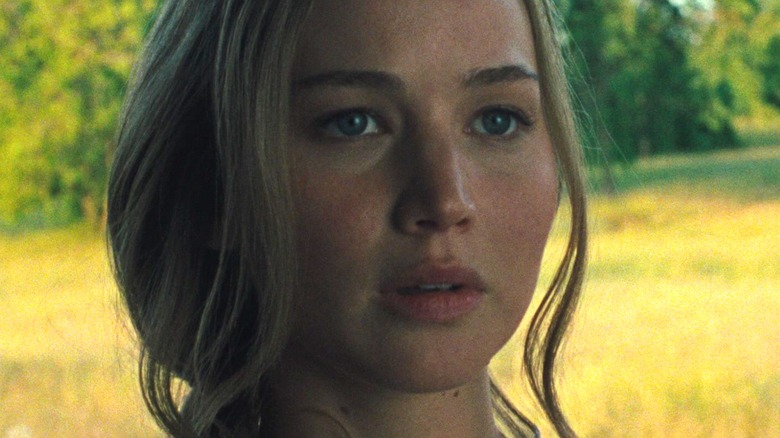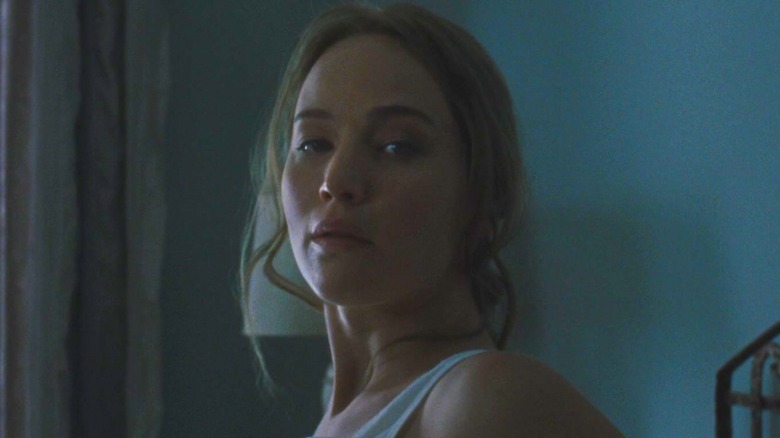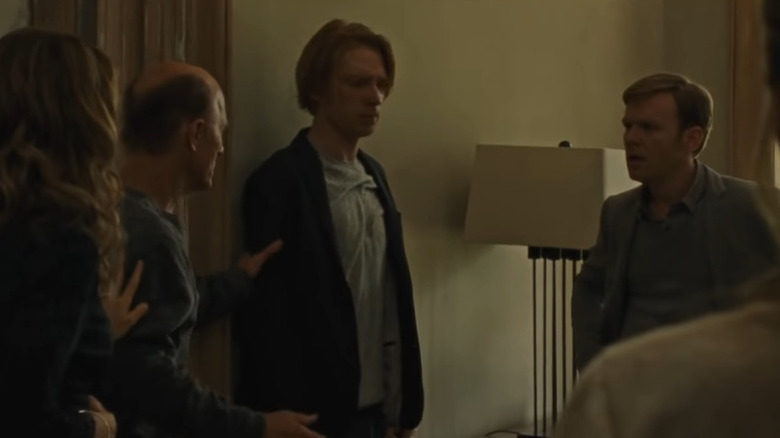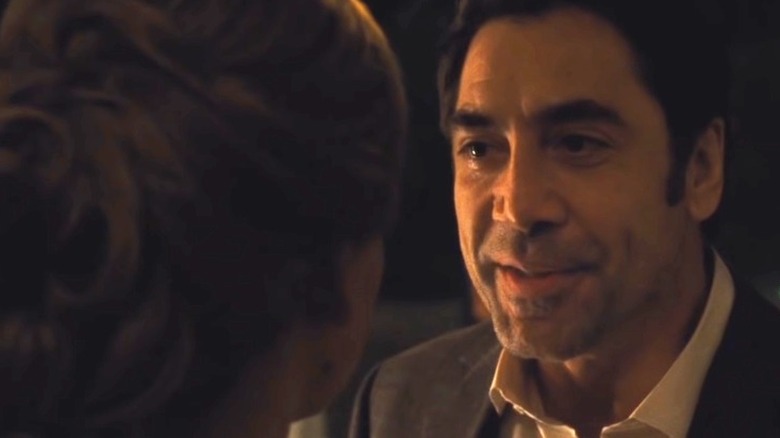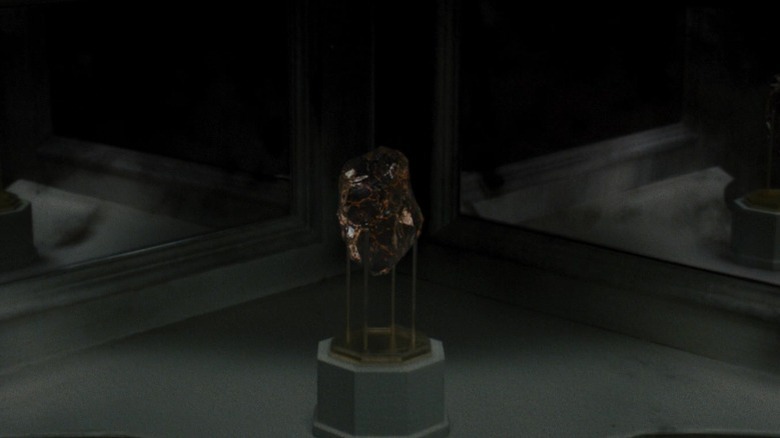The Ending Of Mother! Explained
There are no words to describe the fever dream of an experience that is Darren Aronofsky's 2017 psychological horror film, "mother!" Chock full of hard-to-watch scenes, off-kilter performances, and endless allegories, you'd be hard-pressed to find an article or video about the film that doesn't spend half its time just trying to explain its manic plot. To put it as simple as can be put, the film sees a couple known as mother (played by Jennifer Lawerence) and Him (Javier Bardem) have their relationship put to the test when uninvited visitors start invading the house.
Bombing at the box office amongst its release (via Box Office Mojo) and dividing critics and audiences (via Rotten Tomatoes), even mentioning the film today is bound to start a series of passionate discussions. Some praise the film for its unconventional, avant-garde approach, while others absolutely despise its extreme nature. Whether you love it or hate it, there's no denying that the film certainly isn't afraid to break the rules.
When looking at the film as a whole, there are countless interpretations you can take. This includes how you view the film's conclusion, which is what we're going to be diving into today. So let's see if "mother!" and its themes wind up making its ending a maddening mess or a maniacal masterpiece.
The awakening of Mother Nature
To better understand the ending, it's necessary that we look at the film's beginning. The film opens as we see a woman withering away in the flames of a house. Javier Bardem, referred to here simply as Him, places a crystal in a little stand, which repairs the house. Following this, we see Jennifer Lawerence's mother (all roles except for Him are stylized in lowercase) awaken and search for Him.
Within these opening minutes, the film wastes no time in telling us just what kind of experience we are in for. If it isn't obvious from the names, it's clear that Bardem's Him is meant to represent God, an almighty being who creates the world, while Lawrence's mother is a representation of Mother Nature. The significance of these roles will become more apparent later on as the conflict intensifies, but at this point, we are told practically all we need to know that will set the story in motion. Him is the creator, while mother is the preserver that cares for both Him and the world. Using a married couple to embody these roles works itself into the film organically and as things continue on, those roles will be challenged.
Mankind plays a role
Another important allegory to understand the film better is the involvement of mankind in shaping the world. Starting off, a mysterious man, simply named man, is allowed to stay over at the house for some time, much to mother's dismay. Things only escalate as a woman and two brawling brothers join the mix. Man and woman cause chaos as they destroy the crystal that Him has forbidden them from touching, while one of the jealous brothers ends up murdering the other with a doorknob.
If you were unsure, the inclusion of man and woman is meant to represent the world's first people, Adam and Eve, while the brothers represent the dueling brothers, Cain and Abel. Their destructive tendencies taint the once peaceful house, causing it to bleed from random spots that only mother seems to notice.
As we approach the third act, man's role grows in intensity. Him, who was struggling with writer's block while trying to create a poetry book, has finally published an acclaimed piece. This brings an endless number of strangers to the house, all of whom are obsessed with Him's words and pledge their loyalty to him. What follows is a series of increasingly wild events, escalating from wrecking the house to police raids and literal warfare. The strangers are representations of mankind as a whole. Their loyalty to their God and the varying beliefs in the words of the Bible have brought violence, war, and destruction. And the only thing worse than what they do to one another is how they treat the world they live in.
God vs Nature
While Him and mother ultimately care about one another, as the events escalate, their relationship is stretched to the limit throughout the film. Mother's main goal is to sustain, preserve, and protect the home while showing kindness to those that inhabit it. But due to her kindness, people abuse her and her resources, which only depletes the house. This is shown through a beating heart that sits within the walls and withers away as the abuse gets worse. Him, on the other hand, looks past the people's destructive nature as they are loyal to him. The division reaches its peak with what's easily the film's most gut-wrenching moment.
As the madness continues, mother gives birth to their baby, which the two were initially very excited for. But now, with the obsessed crowd waiting outside the room, it becomes a stand-off as Him hopes to let the crowd see their newborn and mother refuses to let the child go. After dozing off, mother awakens to find Him giving the baby to the crowd and allowing them to pass him around wildly. The rough handling kills the baby and mother witnesses the crowd devour the infant's corpse.
The clear religious allegories to Jesus Christ and the common church practice of eating his flesh and drinking his blood aside, it also showcases the absolute low point of mother and Him's regression. Now completely loyal to their duties, they find themselves at odds. Mother wants to preserve her creations, but Him wants to provide his followers a savior at all costs.
The cycle continues
Remember when we said to keep the opening of the film in mind to understand the ending? Well, here's when it pays off.
Him pleads for mother to forgive the baby-eating intruders, but it's too late. Mother goes to the basement and ignites an oil tanker she discovered earlier in the film, destroying everything and everyone in the household. Mother is left horrendously burned, but Him is without a scratch. He gives mother some comfort before asking if he can have her "love." When she agrees, he reaches into her chest and pulls out her heart, which turns out to be the very same crystal we saw at the start of the film. He places the crystal in the same stand he did at the beginning, which repairs the house and births a new mother.
Like a forest after a wildfire, mother will rise up from the ashes and start the cycle over again. At the same time, we are left to wonder if the rebirth will indicate yet another cycle of destruction. Every new era of human existence will see its own form of mistreatment to the world and one another, spelling out their own demise in the process. Him, as the almighty being that preordains the cycle, has the power to influence those ideas, so will he do things differently this time around or is it destined to restart itself again? We can assume from the burning woman at the start of the film and mother's death here, that the cycle has already happened in the past. So perhaps it is their destiny to play out the tragedy until the end of time.
